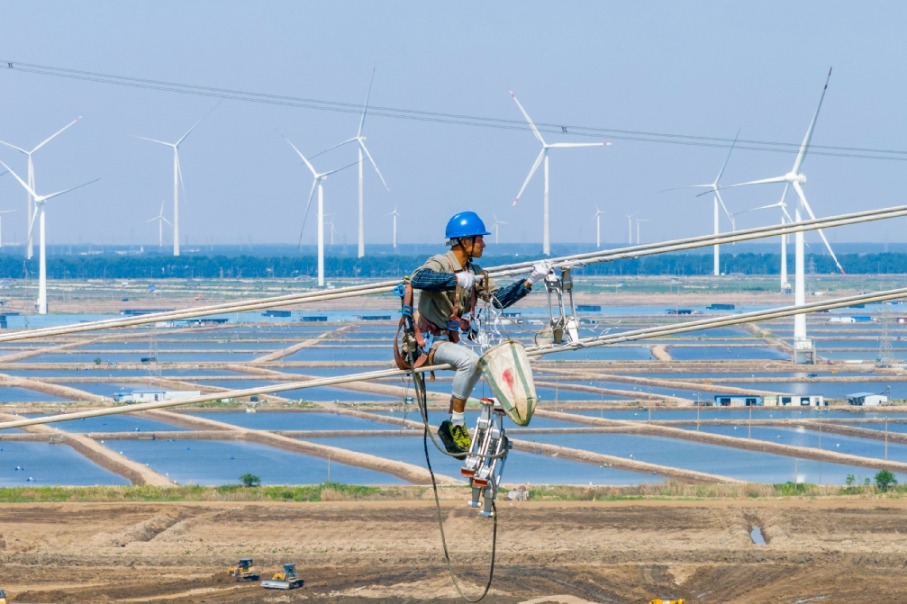China's foreign exchange reserves hit record high

Expectations for yuan to appreciate further may be behind THE surge
China's foreign exchange reserves rose to a record $2.85 trillion (2.2 trillion euros) by the end of last year, an 18.7 percent increase year-on-year, sparking concerns about the country's already excessive liquidity, analysts say.
Compared with nearly $2.65 trillion in foreign reserves by the end of September, the figure increased $199 billion in the fourth quarter, marking the fastest rate on a quarterly basis in 2010, according to a Jan 11 statement by the People's Bank of China.
Spurred by the appreciation of the yuan, the expectations of more interest rate hikes, and the aggressive financial policy in the United States, the country's foreign reserves have grown rapidly since the third quarter of 2010, analysts say.
Yi Gang, vice-governor of the central bank and head of the State Administration of Foreign Exchange (SAFE), said in an interview with China Forex magazine that the country will make its currency exchange rate more flexible this year to reduce the trade surplus and inflationary pressures caused by high liquidity.
As the yuan's value rises, the reduced trade surplus (a major factor in foreign exchange reserves) and possibly lower inflows of speculative capital from overseas would help ease problems caused by high liquidity, such as inflation and asset bubbles, according to analysts.
Wang Tao, head of China economic research at UBS Securities, said in a research note that the central bank is faced with persistently large foreign reserves accumulation. She expected further net issuance of central bank bills and more hikes to banks' reserve requirement ratios in 2011.
The reserve requirement is the ratio of money that commercial banks are required to keep in reserve. It is a tool used by the central bank to control market liquidity.
China has been facing the problem of excessive liquidity since the government instigated stimulus measures worth $586 billion in late 2008 and adopted a monetary policy to propel an economy battered by the global financial crisis. Analysts have said that increased capital inflows, as investors sought a safe haven in China, could also have contributed to the problem.
In 2010, inflation has become more apparent as a result of the expansion of lending in previous years. In November, China's consumer inflation jumped to 5.1 percent, the fastest clip in more than two years.
In 2010, new yuan loans reached 7.95 trillion yuan ($1.2 trillion), exceeding the government's target of 7.5 trillion yuan.
Meanwhile the M2, the broad measure of money supply that includes cash and all types of deposits, rose 19.7 percent from the previous year, the central bank said on Jan 11.
The monetary easing policies adopted by the world's major economies also pushed up capital inflows that will fuel inflation, said Liu Mingkang, the country's chief banking regulator in December.
"Cross-border capital inflows could have increased remarkably in the fourth quarter, based on a rough calculation of the newly added foreign exchange reserves, deducting foreign direct investment and the trade surplus," said E Yongjian, an economist with the Bank of Communications. "(Capital inflows) have contributed a lot to the rapid growth of portfolios."
As China's import growth outpaced export growth, its trade surplus in December was $13.1 billion, an eight-month low, while foreign exchange reserves increased by $16.4 billion over the period.
E Yongjian said that the large increases in foreign exchange reserves in December were mainly attributable to stronger expectations of yuan appreciation.
As of Dec 31, the yuan's reference rate against the dollar was 6.6227, the highest since 2005, and it was more than 3 percent higher than in June.
Most institutions have predicted that domestic GDP growth will remain above 8 percent in 2011, and the yuan will appreciate at a pace between 3 and 5 percent, which may further attract foreign capital inflows.
"The yuan is expected to appreciate about 5 percent against the US dollar, partly due to a systematic depreciating pressure of the US dollar," says Shen Minggao, head of China Research of Citi Investment Research with Citigroup.
Gao Changxin contributed to this story.
Today's Top News
- Nepal's hydropower a climate change solution
- UN Charter still guiding compass of humankind
- Leaders pledge to strengthen Sino-Senegalese relations
- China, Ecuador to support each other's core interests
- Details on trade talks confirmed
- Bolder steps likely to boost demand






























